Best Dog Beds for Golden Retrievers
Orthopedic Beds Are Great for Golden Retrievers!
Introduction
Choosing the right dog bed for a Golden Retriever depends on factors like size, age, and individual preferences. Because of health issues, orthopedic beds are best. Ultimately, you just observe your Golden Retriever’s sleeping habits and preferences to determine which type of bed is best for them.
Providing a comfortable and supportive sleeping environment is essential for their overall health and well-being. Golden Retrievers are a beloved canine companion renowned for their friendly demeanor, intelligence, and versatility.
Originating in Scotland in the late 19th century, these dogs were initially bred as hunting companions, adept at retrieving waterfowl and game birds. Their distinctive golden coats, gentle temperament, and unwavering loyalty have made them cherished family pets worldwide.
Golden Retrievers are known for their sociable nature, thriving in the company of humans and other animals alike. Their intelligence and eagerness to please make them highly trainable, excelling in obedience, therapy work, and various canine sports.
With their boundless energy and affectionate personalities, Golden Retrievers will bring joy and companionship to countless households.
Golden Retrievers have two basic sleeping styles, and they are stretching out or laying against something for support for their head and body. The types of dog beds that meet these conditions are rectangle and bolster.
We have provided some of the best rated orthopedic beds for each type below.
Facts about Golden Retrievers
We will now share some facts about Golden Retrievers:
- Friendly Temperament: Golden Retrievers are known for their friendly and gentle temperament. They are affectionate, loyal, and great with children, making them a popular family pet.
- Average Weight: Males: 65 – 75 lbs. Females: 55 – 65 lbs.
- Average Length: 37 – 42 Inches
- Average Height: Males: 22” – 24” Females 20” – 22”
- Average Life Span: 10 – 12 Years
- Full Grown: 18 months
- Colors: Cream, Gold, Red
- Popularity: This breed is the 3rd most popular in the United States according to the American Kennel Club.
- Intelligence: This breed is the 3rd most intelligent out of 100 breeds according to Professor Stanley Coren at the University of Colombia.
- Types of Golden Retrievers: English, American, & Canadian
- Versatile Working Dogs: In addition to being excellent family pets, Golden Retrievers are also versatile working dogs. They are commonly employed as service dogs, therapy dogs, search and rescue dogs, and guide dogs for the visually impaired due to their intelligence and gentle nature.
- Energetic and Active: Golden Retrievers are energetic and active dogs that require regular exercise to stay healthy and happy. They enjoy activities such as swimming, hiking, and playing fetch, making them great companions for outdoor enthusiasts.
- Love for Water: Many Golden Retrievers have a natural affinity for water and are excellent swimmers. Their love for water can be traced back to their hunting heritage, as they were originally bred to retrieve game from water.
- Intelligence: This breed is the 4th most intelligent out of 100 breeds according to Professor Stanley Coren of the University of British Colombia. This trait makes them relatively easy to train, and they excel in obedience and agility training.
- Social Butterflies: Golden Retrievers are social dogs that thrive on human companionship. They enjoy being part of the family and may exhibit separation anxiety if left alone for extended periods. They are happiest when they are included in family activities and given plenty of attention and affection.
- Health Considerations: While generally healthy dogs, Golden Retrievers are prone to certain health issues, including hip dysplasia, elbow dysplasia, and various genetic disorders such as progressive retinal atrophy (PRA) and certain types of cancer. Responsible breeding and regular veterinary care can help mitigate these risks.
Knowing these facts you can get ready for your house guest.
Choosing Dog Beds For Golden Retrievers
Choosing the right dog bed for a Golden Retriever depends on factors like size, age, and their preferences. Here are some options that are generally suitable for Golden Retrievers.
- Orthopedic Beds: This type of dog breed are prone to joint issues as they age. Orthopedic beds with memory foam or supportive padding can provide relief for achy joints and promote better sleep.
- Beds with Ample Padding: Given their size, Golden Retrievers require larger beds to comfortably stretch out. Look for beds with ample padding to cushion their bodies and provide support.
- Waterproof Beds: Golden Retrievers have a water-repellent coat and may bring moisture into the house after outdoor activities. Waterproof or water-resistant beds can help prevent mold and mildew buildup, keeping the sleeping area clean and dry.
- Elevated Beds: Elevated or raised beds can provide added support by keeping your Golden Retriever off the hard, cold floor. They also promote airflow, which can be beneficial for dogs prone to overheating.
- Washable Covers: This breed is known for shedding, so opt for beds with removable, machine-washable covers for easy cleaning. This helps keep the bed fresh and free from odor and allergens.
- Durable Materials: Choose beds made from durable materials that can withstand your dog’s scratching, digging, and nesting behaviors. Heavy-duty fabrics like canvas or denim are good options.
- Cozy and Warm: Golden Retrievers appreciate warmth and comfort, especially during colder months. Beds with plush, fleece-lined interiors or heated options can provide extra coziness.
- Bolster or Rectangle: By knowing the sleeping style of your dog will help you to determine which type of bed bolster or rectangle is best for him.
- Bolster: Bolster beds provide support for the head and body while sleeping.
- Rectangle: Rectangle beds are for dogs that like to stretch out when sleeping.
The bottom line here is to provide the most comfortable and supportive sleeping environment which is essential for their overall health and well-being.
Common Health Issues with Golden Retrievers
Below we mention some of the most common health issues you may experience with your Golden Retriever during their lifetime.
- Hip Dysplasia: This is a common genetic condition where the hip joint doesn’t develop properly, leading to arthritis and mobility issues.
- Elbow Dysplasia: Similar to hip dysplasia, elbow dysplasia is a developmental abnormality affecting the elbow joint, causing lameness and discomfort.
- Cancer: Golden Retrievers have a higher predisposition to certain types of cancer, including lymphoma, hemangiosarcoma, and mast cell tumors.
- Progressive Retinal Atrophy (PRA): PRA is a hereditary degenerative eye disorder that eventually leads to blindness.
- Subvalvular Aortic Stenosis (SAS): This is a heart condition characterized by a narrowing of the aortic valve, which can lead to heart failure if left untreated.
- Hypothyroidism: Golden Retrievers are prone to thyroid gland issues, which can lead to weight gain, lethargy, and skin problems.
- Allergies: Golden Retrievers can suffer from allergies to environmental triggers, food, or flea bites, leading to skin irritation and discomfort.
- Ear Infections: There floppy ears make Golden retrievers more susceptible to ear infections, especially if not kept clean and dry.
- Gastric Dilatiation-Volvulus (GDV): Also known as bloat, this is a life-threatening condition where the stomach fills with gas and twists on itself, cutting off blood flow. Golden Retrievers are one of the breeds at a higher risk for GDV.
- Obesity: Golden Retrievers love to eat and can easily become overweight if not given a proper diet and exercise, leading to joint problems and other health issues.
- Regular Veterinary Check-ups: A healthy diet, regular check-ups, and exercise are helpful in early detection and intervention for managing many of these conditions.
Differences Between Labrador and Golden Retrievers
Now let’s share some of the differences between Labrador Retrievers and Golden Retrievers.
- Coat: One of the most noticeable differences between the two breeds is their coat. Golden Retrievers have a dense, water-repellent double coat that is typically golden in color, ranging from light to dark shades. Labrador Retrievers have a short, dense, water-resistant coat that comes in three colors: black, chocolate, and yellow.
- Origins: Golden Retrievers originated in Scotland in the late 19th century, while Labrador Retrievers originated in Newfoundland, Canada, during the 19th
- Temperament: While both breeds are known for their friendly and gentle nature, there are some differences in temperament. Golden Retrievers tend to be slightly more outgoing and eager to please, while Labrador Retrievers are known for their friendly and outgoing demeanor, as well as their high energy levels.
- Size: Golden Retrievers are generally slightly larger than Labrador Retrievers.
- Activity Level: Both breeds are active and energetic, but Labrador Retrievers tend to have slightly higher energy levels and may require more exercise to stay mentally and physically stimulated. They are often described as being “always ready to go” and enjoy activities such as swimming, fetching, and running.
- Trainability: Both Golden Retrievers and Labrador Retrievers are highly intelligent and trainable breeds. However, Golden Retrievers may be slightly easier to train due to their eager-to-please nature and desire to work closely with their owners.
- Purpose: While both breeds were originally bred as retrieving dogs, they were developed for slightly different purposes. Golden Retrievers were bred to retrieve waterfowl and game birds for hunters, while Labrador Retrievers were bred to assist fishermen in retrieving fishing nets and hauling in fish from the water.
- Popularity: Labrador Retrievers consistently rank as the most popular dog breed in the United States, according to the American Kennel Club (AKC), while Golden Retrievers are also among the top breeds but typically rank slightly lower in popularity.
Conclusion
Golden Retrievers are a popular dog breed as they are the 3rd most popular in the United States according to the American Kennel Club.
Because of their health issues we stated earlier, we highly recommend looking for orthopedic dog beds. Why? Because they provide support for their aching joints and muscles when sleeping or resting, especially as they get older.
You will need to know the sleeping style of your dog so you can determine which type of bed rectangle or bolster bed is best. Remember, you are matching the dog bed to your dog’s sleeping style.
Golden Retrievers also like the water and need daily exercise. They will be easy to train and games like fetch will be helpful in their exercise routine.
With the proper bed selected your dog should enjoy comfort and support when they are resting or sleeping. Be sure to place the bed out of heavy traffic and drafty areas of the house. This will ensure their privacy and a place they can go that is their own.
You can read about our other dog breed information articles by clicking HERE!
Shop Dog Beds
Shop dog beds for your dog by selecting or clicking on any bed of choice. You will be taken to Amazon where you can read customer reviews and answered questions and place the order.
As an Amazon Associate, I earn from qualifying purchases. Your purchase price is the same as if you shop directly on Amazon.
The price at time of publish is included below to give you an idea of what the price is; however, it is subject to change.
Shop Rectangle Dog Beds
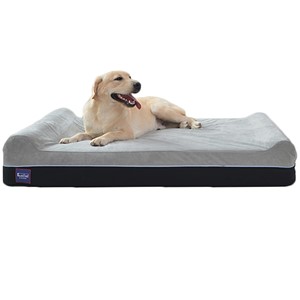
Laifug Large Grey Orthopedic Rectangle Bed
Price At Time of Publish $130.00
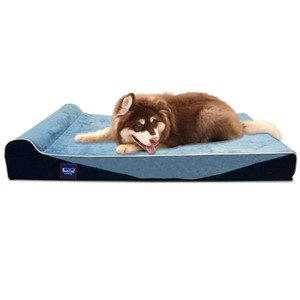
Laifug Large Blue Orthopedic Rectangle Bed
Price At Time of Publish $130.00 $110.00
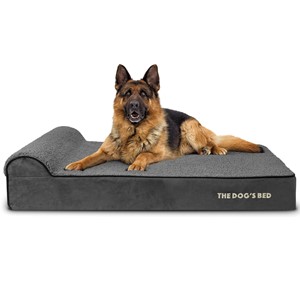
The Dogs Bed XL Grey Orthopedic Rectangle Bed
Price At Time of Publish $130.00 $185.00

KOPEKS Jumbo Orthopedic Rectangular Bed
Price At Time of Publish $130.00 $110.00
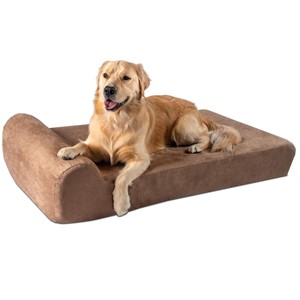
Big Barker XL Orthopedic Rectangle Bed
Price At Time of Publish $130.00 $240.00
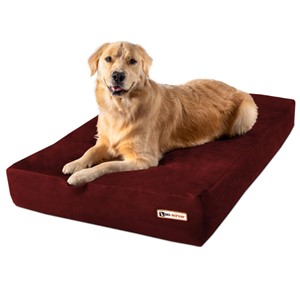
Big Barker XL Burgundy Orthopedic Rectangle Bed
Price At Time of Publish $130.00 $200.00
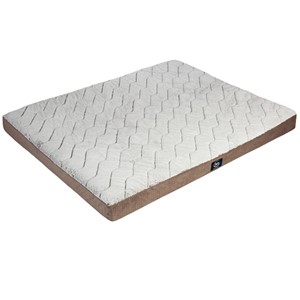
Serta XL Brown Orthopedic Rectangle Bed
Price At Time of Publish $130.00 $80.00
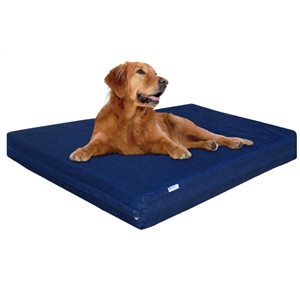
DogBed4Less XL Blue Orthopedic Rectangle Bed
Price At Time of Publish $130.00 $80.00
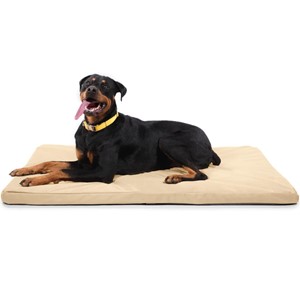
K9 Ballistics XL Sandstone Orthopedic Crate Pad
Price At Time of Publish $130.00 $159.00
Shop Bolster Dog Beds
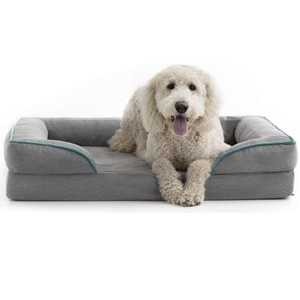
Brindle XL Gray Orthopedic Bolster Bed
Price At Time of Publish $130.00 $79.00
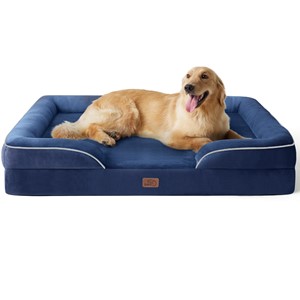
Bedsure XL Blue Orthopedic Bolster Bed
Price At Time of Publish $130.00 $76.00
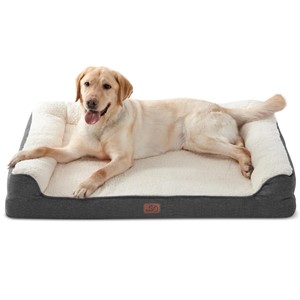
Bedsure XL Grey Orthopedic Bolster Bed
Price At Time of Publish $130.00 $60.00
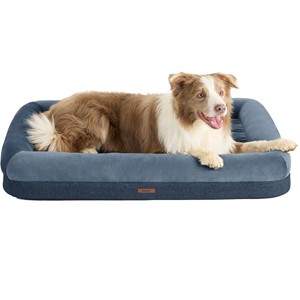
Lesure XL Navy Orthopedic Bolster Bed
Price At Time of Publish $130.00 $40.00
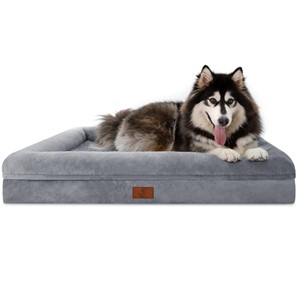
Yiruka XL Grey Orthopedic Bolster Bed
Price At Time of Publish $130.00 $55.00
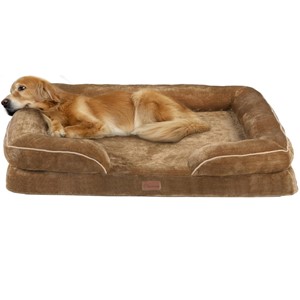
Yitahome XL Brown Orthopedic Bolster Bed
Price At Time of Publish $130.00 $37.00
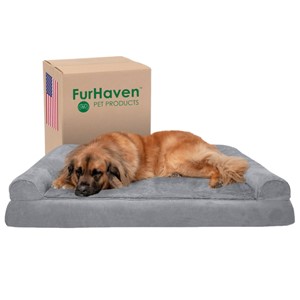
Furhaven XL Gray Orthopedic Bolster Bed
Price At Time of Publish $130.00 $130.00
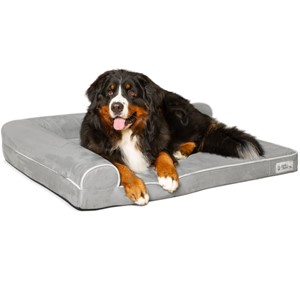
PetFusion XL Grey Orthopedic Bolster Bed
Price At Time of Publish $130.00 $60.00
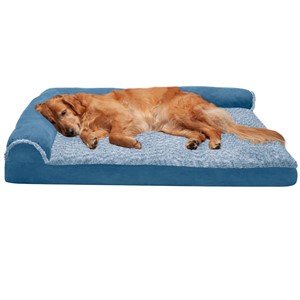
Furhaven Jumbo Blue Orthopedic Bolster Bed
Price At Time of Publish $130.00 $60.00
Shop Elevated Dog Beds
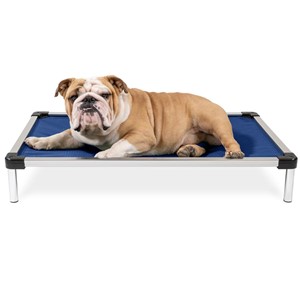
K9 Ballistics Chew Proof Elevated Small Bed
Price At Time of Publish $130.00 $129.00
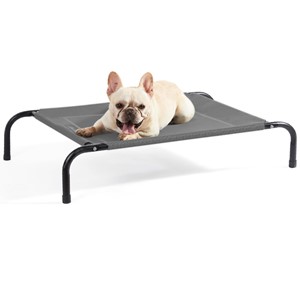
Bedsure Medium Elevated Dog Bed
Price At Time of Publish $130.00 $33.00
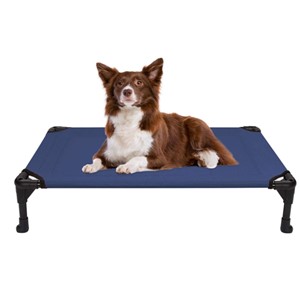
Veehoo Medium Elevated Dog Bed
Price At Time of Publish $130.00 $45.00
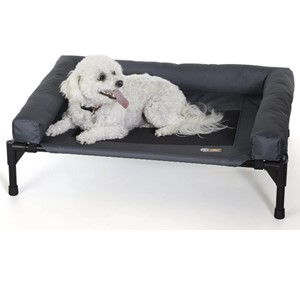
K&H Pet Products Elevated Bolster Dog Bed
Price At Time of Publish $130.00 $57.00
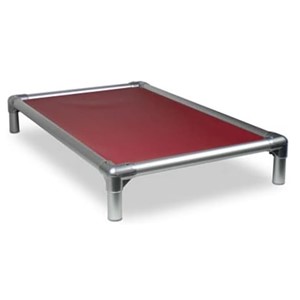
Kuranda Elevated Chew Proof Small Dog Bed
Price At Time of Publish $130.00 $134.00
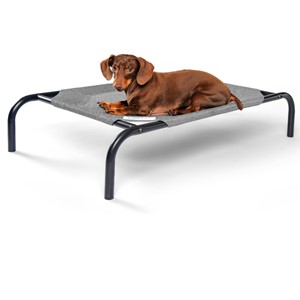
Coolaroo Small Elevated Dog Bed
Price At Time of Publish $130.00 $21.00
Related Articles
Below are some other articles that might be of interest to you.
- Best Healthy Dog Food Brands
- Christmas Presents for My Dog
- Common Health Problems for Dogs
- Ingredients To Avoid In Dog Treats
- Using Alexa for Dog Behaviors
- What To Do for Dogs With Arthritis
Go back to the Dog Luxury Beds home page.
